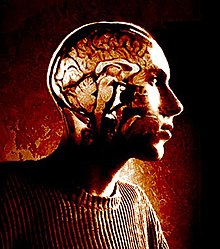| Cognitive psychology |
| Negative affect |
|---|
 |
| Psychology |
| Cognitive psychology • Emotion Affect (psychology) • Positive affectivity Positive psychology |
Negative affectivity (NA), or negative affect, is a personality variable that involves the experience of negative emotions and poor self-concept.[1] Negative affectivity subsumes a variety of negative emotions, including anger, contempt, disgust, guilt, fear,[2] and nervousness. Low negative affectivity is characterized by frequent states of calmness and serenity, along with states of confidence, activeness, and great enthusiasm.
Individuals differ in negative emotional reactivity.[3] Trait negative affectivity roughly corresponds to the dominant personality factor of anxiety/neuroticism that is found within the Big Five personality traits as emotional stability.[4] The Big Five are characterized as openness, conscientiousness, extraversion, agreeableness, and neuroticism. Neuroticism can plague an individual with severe mood swings, frequent sadness, worry, and being easily disturbed,[1][3] and predicts the development and onset of all "common" mental disorders.[5] Research shows that negative affectivity relates to different classes of variables: Self-reported stress and (poor) coping skills,[1][6][7] health complaints, and frequency of unpleasant events.[8] Weight gain and mental health complaints are often experienced as well.
People who express high negative affectivity view themselves and a variety of aspects of the world around them in generally negative terms.[1] Negative affectivity is strongly related to life satisfaction. Individuals high in negative affect will exhibit, on average, higher levels of distress, anxiety, and dissatisfaction, and tend to focus on the unpleasant aspects of themselves, the world, the future, and other people, and also evoke more negative life events.[8] The similarities between these affective traits and life satisfaction have led some researchers to view both positive and negative affect with life satisfaction as specific indicators of the broader construct of subjective well-being.
Negative affect arousal mechanisms can induce negative affective states as evidenced by a study conducted by Stanley S. Seidner on negative arousal and white noise. The study quantified reactions from Mexican and Puerto Rican participants in response to the devaluation of speakers from other ethnic origins.[9]
- ^ a b c d Watson, D.; Clark, L. A. (1984). "Negative affectivity: The disposition to experience negative aversive emotional states". Psychological Bulletin. 96 (3): 465–490. doi:10.1037/0033-2909.96.3.465. PMID 6393179.
- ^ Koch, Alex S.; Forgas, Joseph P.; Matovic, Diana (August 2013). "Can negative mood improve your conversation? Affective influences on conforming to Grice's communication norms". European Journal of Social Psychology. 43 (5): 326–334. doi:10.1002/ejsp.1950.
- ^ a b Tellegen, A. (1985). Structures of mood and personality and their relevance to assessing anxiety, with an emphasis on self-report. In A. H. Tuma & J. D. Maser (Eds.), Anxiety and the Anxiety disorders, (pp. 681-706), Hilssdale, NJ: Erlbaum.
- ^ Jeronimus, B.F.; Ormel, J.; Aleman, A.; Penninx, B.W.J.H.; Riese, H. (2013). "Negative and positive life events are associated with small but lasting change in neuroticism". Psychological Medicine. 43 (11): 2403–15. doi:10.1017/s0033291713000159. PMID 23410535. S2CID 43717734.
- ^ Jeronimus, B.F.; Kotov, R.; Riese, H.; Ormel, J. (2016). "Neuroticism's prospective association with mental disorders halves after adjustment for baseline symptoms and psychiatric history, but the adjusted association hardly decays with time: a meta-analysis on 59 longitudinal/prospective studies with 443 313 participants". Psychological Medicine. 46 (14): 1–24. doi:10.1017/S0033291716001653. PMID 27523506. S2CID 23548727.
- ^ Tessler, R.; Mechanic, D. (1978). "Psychological distress and perceived health status". Journal of Health and Social Behavior. 19 (3): 254–262. doi:10.2307/2136558. JSTOR 2136558. PMID 701774.
- ^ Wills, T. A. (1986). "Stress and coping in early adolescence: Relationships to substance use in urban school samples". Health Psychology. 5 (6): 503–529. doi:10.1037/0278-6133.5.6.503. PMID 3492372.
- ^ a b Jeronimus, B. F.; Riese, H.; Sanderman, R.; Ormel, J. (2014). "Mutual Reinforcement Between Neuroticism and Life Experiences: A Five-Wave, 16-Year Study to Test Reciprocal Causation". Journal of Personality and Social Psychology. 107 (4): 751–64. doi:10.1037/a0037009. PMID 25111305.
- ^ Seidner, Stanley S. (1991), Negative Affect Arousal Reactions from Mexican and Puerto Rican Respondents, Washington, D.C. ERIC ED346711
© MMXXIII Rich X Search. We shall prevail. All rights reserved. Rich X Search
